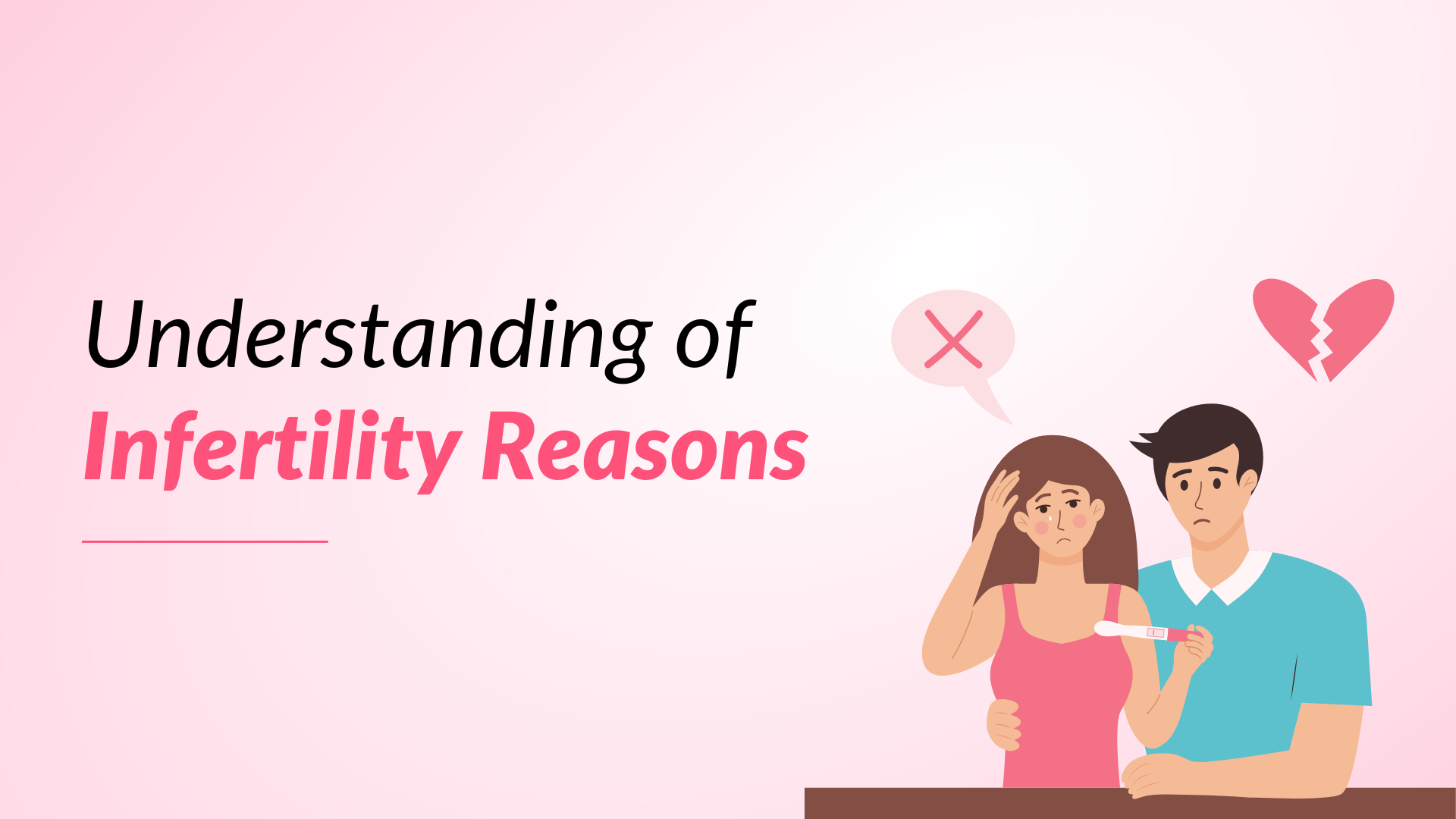Understanding of Infertility Reasons
Reviewed By: Dr. Spoorthy Chennamaneni, fertility specialist at Ferty9 Fertility Clinic, Kukatpally, Hyderabad
Infertility is a condition that impairs a person's ability to conceive or carry a pregnancy to term. The main reasons for infertility include hormonal imbalances, structural abnormalities, genetic conditions, or aging. Fertility issues can affect men and women, and the causes range from lifestyle choices to underlying medical conditions. Frequently, a combination of circumstances contributes to infertility. Understanding these causes is critical for proper diagnosis, treatment, and emotional well-being.
Also read: Is India Facing an Infertility Crisis?
What is Infertility?
Infertility happens when a couple is unable to conceive, despite having regular, unprotected intercourse. Infertility is defined as the inability to become pregnant after one year (or more) of unprotected intercourse. Infertility occurs when a male or female is unable to conceive due to an issue with one of the partners' reproductive systems. Couples who want to be parents may find it challenging to conceive a child. Many couples who battle with infertility end up having children, sometimes with medical assistance. There are two types of infertility.
- Primary infertility is defined as couples who have not conceived after at least one year of having sex without using any birth control measures.
- Secondary infertility occurs when couples have been able to conceive at least once but are now unable to get pregnant.
Common Causes of Infertility
Many medical conditions are the main reason for infertility. It could be a problem with the woman, the man, or both.
Causes of Female Infertility
Female infertility occurs when the ovaries have difficulty producing healthy eggs. The eggs find difficulty in moving from the ovaries to the uterus, the fertilized egg fails to attach to the uterine lining, or the fertilized egg / embryo does not survive after implantation. Some causes of female infertility includes disruption of ovarian function, fallopian tube obstruction, and abnormalities of the uterus.
- Disruption in ovarian function may be caused by various conditions, including Polycystic ovary syndrome (PCOS), Diminished ovarian reserve (DOR), impaired function of the hypothalamus and pituitary glands, Functional hypothalamic amenorrhea (FHA), and Primary ovarian insufficiency (POI). The right balance of hormones is required for efficient reproductive cycles, such as ovulation in women, as well as the general reproductive system. Hormonal abnormalities are the primary cause of infertility in women. There is no single test that accurately predicts fertility; however, there is testing for common markers of ovarian function. These include follicle-stimulating hormone (FSH), anti-Müllerian hormone (AMH), and antral follicle count (AFC) assays.
- Fallopian tube obstruction can result from factors such as a history of pelvic infection, gonorrhea, chlamydia, endometriosis, a ruptured appendix, or prior abdominal surgery. Fallopian tubes can be assessed using a variety of procedures, including a hysterosalpingogram and chromopertubation.
- Problems affecting the physical characteristics of the uterus include intrauterine adhesions, endometrial polyps, adenomyosis, congenital uterine anomalies, and fibroids. Transvaginal ultrasonography can be used to check the uterus for a variety of issues. A sonohystogram or hysteroscopy can also be used to examine the uterine environment.
- As women age, their eggs decline in quantity and quality, affecting their fertility.
- Many lifestyle factors, including the age at which to start a family, nutrition, weight, exercise, psychological stress, environmental and occupational exposures, and others, can have a great impact on fertility. Lifestyle factors such as cigarette smoking, drug use, and alcohol and caffeine consumption can all have a negative impact on female fertility.
Causes of Male Infertility
Male infertility can be caused by disruptions in testicular or ejaculatory function, as well as hormonal and genetic problems.
Male infertility causes include;
- Low sperm count (Oligospermia)
- Poor sperm motility (Asthenospermia)
- Abnormal sperm shape (Teratospermia)
These issues affect the ability of sperm to fertilize an egg.
- Genetic factors such as Klinefelter syndrome and other genetic disorders affect male fertility.
- Hormonal imbalance, or blockages in the reproductive tract, are the main reasons for infertility.
- Va ricoceles are one of the known causes of male infertility, altering sperm production, lowering sperm quality, and perhaps lowering testosterone levels.
- Lifestyle factors like smoking, excessive alcohol use, and exposure to toxins may further reduce fertility.
- A semen study, a comprehensive medical history, and a physical examination are often used to examine it. This assessment helps to establish the causes of male infertility.
Unexplained Infertility
Unexplained infertility refers to the inability of a couple to conceive despite undergoing standard fertility tests, which show no identifiable medical or physiological issues in either partner. This condition accounts for approximately 22-28% of infertility cases and is diagnosed after a thorough evaluation, including hormone tests, ultrasound imaging, semen analysis, and ovulation tracking. Even though no specific cause is detected, factors such as subtle sperm, egg, or uterine lining abnormalities might still play a role. Couples with unexplained infertility often explore treatments like lifestyle changes, fertility medications, or assisted reproductive technologies such as IVF or IUI to improve their chances of conception.
Diagnosing Infertility
In order to uncover potential causes of infertility, the couples must be thoroughly evaluated. For women, tests include ovulation assessment, hormone testing, pelvic ultrasound, and uterine and fallopian tube imaging, such as hysterosalpingography or laparoscopy. Men are subjected to physical tests and sperm analysis in order to determine sperm quality and quantity. A comprehensive evaluation helps determine appropriate treatment options, taking into account factors such as age, medical history, and the duration of infertility.
Treatment Options for Infertility
Depending on the underlying cause, men and women can receive different types of treatment for infertility: lifestyle modifications, sperm quality-enhancing medications, surgery such as varicocele repair, and sperm retrieval techniques for assisted reproduction; women can benefit from fertility medications to induce ovulation, IUI, or surgeries to address uterine or tubal problems; and ART, including in vitro fertilization (IVF) and intracytoplasmic sperm injection (ICSI), which are frequently used for both sexes. Additional options when biological conception is not feasible include donor eggs, sperm, or surrogacy.
When to Seek Professional Help?
If you have not conceived after one year of regular, unprotected intercourse, and if you are over 35, you should seek professional help for infertility problems. If you have irregular periods, known reproductive disorders (such as PCOS or endometriosis), or a history of pelvic infections or operations, you should see a fertility specialist earlier. Men who have a low sperm count or poor quality should seek an examination as soon as possible. Professional assistance is necessary for treating underlying medical issues and exploring appropriate treatment choices.
Emotional Impact of Infertility
Infertility problems can have a significant emotional impact, leading to feelings of stress, frustration, and isolation. The constant struggle to conceive can result in anxiety, depression, and strained relationships. Couples often face societal pressure and stigma, particularly in cultures where parenthood is highly valued. Getting emotional support from counseling or support groups can help you manage these issues.
Conclusion
Understanding the causes of infertility is critical for proper diagnosis and therapy. Hormonal imbalances, ovulation disorders, obstructed fallopian tubes, and male infertility can contribute to difficulty in conceiving. Lifestyle choices, age, and underlying health issues all play important roles. Seeking immediate medical help can boost the odds of overcoming infertility problems and direct couples to proper treatments and support.
Visit Our Clinic:
Fertility Clinic in Hyderabad
Fertility Clinic in Visakhapatnam
Fertility Clinic in Vijayawada
Fertility Clinic in Karimnagar
Fertility Clinic in Warangal
Fertility Clinic in Rajahmundry
Fertility Clinic in Tirupati
Fertility Clinic in Kurnool

Write your message


